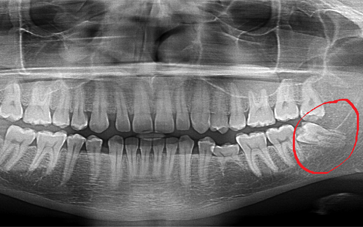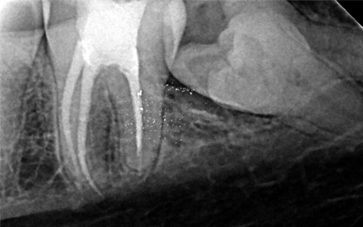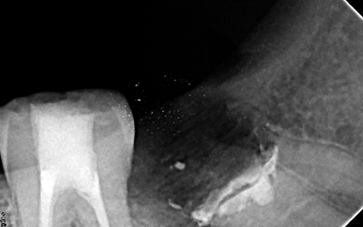
Coronectomy: Is This Best Option and Why?
Dental Coronectomy is a technique used for wisdom teeth surgery where only the crown portion of the tooth is extracted and the root/roots are left in situ ie in the mouth itself.
What is an impacted wisdom tooth?
The wisdom tooth or third molar is the last tooth to erupt into the mouth usually after the age of 16. When there is not enough room in the jaws to accommodate wisdom teeth, it does not come into the mouth normally. When this happens, the wisdom teeth are said to be ‘impacted’. Wisdom teeth are usually either in the bone or growing towards the adjacent tooth or erupted but covered like a blanket with a layer of gums over it. An impacted/ stuck wisdom tooth can cause repeated pain over time and also become a source of infection in the gums surrounding the tooth, causing excruciating pain and swelling.
Why does one need the treatment of an impacted wisdom tooth?
If the tooth is left untreated, the impacted wisdom tooth will continue to cause repeated episodes of infection and pain. Food lodgement can occur as there will be a space created in the gums, which can cause decay in the adjacent tooth as well.
Cysts (hollow cavity with or without pus) can form around the wisdom tooth if it does not erupt properly in time and left untreated.
The options are wisdom teeth removal i.e., Extraction or removal of only the crown portion of the tooth ie Coronectomy .
Why is coronectomy the treatment of choice?
Lower wisdom teeth can lie very close to the nerve that supplies the lower jawbone.
If the roots of the lower wisdom tooth are very close to the mandibular nerve or the roots are entangled with the nerve or if the nerve is passing in between the roots of the tooth then coronectomy is preferred as the best treatment option as compared to the complete removal of the tooth. Intentionally leaving the roots behind reduces the risk of damaging the nerve which can cause partial or complete numbness/ paralysis in the lip, chin, cheek, gums and tongue.
There are only certain situations where this procedure is recommended. If the wisdom molar itself is decayed or has underlying swelling or infection, then in such cases it’s not healthy to leave the roots behind.
Coronectomy guidelines
Coronectomy can be beneficial but success requires both good patient selection and operator technique. There are some simple guidelines which clinicians need to be aware of to avoid failure. They are as follows:
- Teeth with associated infection, particularly infection involving the root portion, should be excluded from this technique
- Teeth that are mobile should be excluded as they act as a mobile foreign body and become a nidus for infection or migration
- If the pulp of the tooth is exposed
- The technique of leaving the retained root fragment at least 3 mm inferior to the crest of the bone seems appropriate and appears to encourage bone formation over the retained root fragment over a period of time.
- Late migration of the root fragment may occur in some cases, but is unpredictable. However, in most cases the root fragments move into a safer position with regard to the nerve and then can be removed. Case reports have suggested that it can take up to ten years for the root fragments to erupt.
- The operative site should be primarily closed in a tension free manner
POST OPERATIVE MANAGEMENT OF CORONECTOMY
Swelling
In case there is swelling, it lasts for up to a week. The amount of swelling varies from patient to patient. In addition to this the application of an ice pack during the first 24 hours post-operatively may help. Do not apply the ice pack directly to your skin, but wrap the ice pack in a towel first.
Restricted mouth opening
This occurs sometimes and is a consequence of swelling; it often settles once the swelling disappears. During this time when your mouth opening is restricted you may have to modify your diet, eating soft foods. There are however no hard and fast rules about what you should eat. You must however keep your mouth as clean as possible to reduce the risk of infection using regular mouthwashes.
Bleeding
Although there may be a little bleeding at the time of the procedure this usually stops very quickly and is unlikely to be a problem if the wound is stitched. If by chance the area bleeds again when you get home this can usually be stopped by applying pressure over the area for at least 10 minutes with a rolled-up damp cotton or swab.
Minimising Infection
Infection can be minimised by adopting scrupulous oral hygiene during the recovery phase. This usually encompasses normal tooth brushing with additional mouthwashes as advised plus the avoidance of smoking.
ADVANTAGE OF CORONECTOMY
Two nerves lie in close proximity to impacted wisdom teeth. The lingual nerve provides sensation in your tongue whilst the inferior alveolar nerve gives sensation to the lower lip and skin overlying the chin. These nerves may be bruised during tooth removal. A coronectomy technique ELIMINATES THE CHANCES OF NERVE DAMAGE and consequently the numbness to the lip and chin.
If the nerves are bruised, you may have numbness in tongue, lower lip, skin over the chin. Most of the time it is temporary and recovers within a few months. On rare occasions it may not fully recover and patients may be left with patches of numbness. That is why the availability of Coronectomy treatment comes as a blessing.
Note
- Take an appointment after discussing the procedure by the best dentist in Delhi. You will be sent further information on what you need to do and what to do on arrival.
- It may be necessary to take a few days off work and avoid strenuous exercise for this time. It is recommended to come with an attendant for the extraction so that the after-procedure instructions are clearly stated and someone can drive you back home.
- Next appointment is given after a week for the suture removal if any stitches are given or if necessary, will be arranged if required.
- You will be able to discuss any questions that you may have with the Dentist at the clinic or over a call.
After the operation, you will be given another information leaflet with advice on what to do and how to care for your mouth.
Coronectomy is a high end and precise dental treatment carried out routinely in reputed dental clinics in Delhi, like ‘Smile Delhi- The Dental Clinic.’
Treatment Options for Impacted Wisdom Tooth
To book an appointment with us in, ‘Smile Delhi- The Dental Clinic’– call us on +91- 9811106871 or whatsapp Dr. Suprriya B Bhatia on +91-9811106377. You can also mail us on [email protected]
We Care To Make You Smile.
Posted by: Dr Hema

































































